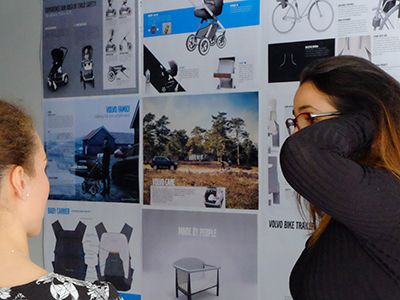Kursen är i huvudsak inriktad på att träna olika färdigheter inom produktdesign. Innehållet kretsar kring ett individuellt designprojekt där bakgrundsstudierna genomförs i grupp. I projektet ska sedan de olika delarna balanseras och gestaltas till en helhet. Hållbarhetsaspekten finns med genom att produkten designas för att fungera i ett produkt-tjänste-system i en cirkulär ekonomi. Inom kursen diskuteras även aktuell forskning inom designområdet i seminarieform i forskningsförberedande syfte, och som teoretisk fördjupning.
I det första momentet av kursen lär sig studenterna olika teorier, koncept och metoder inom användarcentrerad design och applicerar dem i projektarbetet. Här undersöks användarens behov och preferenser, samt produktens önskade hantering och funktionalitet genom flera olika kompletterande metoder. Kunskapen examineras även med en tenta.
Nästa moment handlar om varumärkets betydelse, strategier kring utveckling av varumärken och hur detta påverkar utformningen av produkter och tjänster.
I det avslutande momentet sätts delarna samman genom att en produkt designas och visualiseras individuellt, med hänsyn tagen till både användarstudierna och varumärkesutvecklingen.
Kursen genomförs i projektform vilket är ett praktiskt moment som kräver närvaro och aktivt engagemang av studenterna. Det inkluderar interaktion med lärarna genom aktivt deltagande vid handledning ovh övningar.
MF2112 Avancerad produktdesign 12,0 hp

Information per kursomgång
Välj termin och kursomgång för att se aktuell information och mer om kursen, såsom kursplan, studieperiod och anmälningsinformation.
Information för VT 2026 Start 2026-01-13 programstuderande
- Studielokalisering
KTH Campus
- Varaktighet
- 2026-01-13 - 2026-06-01
- Perioder
VT 2026: P3 (6 hp), P4 (6 hp)
- Studietakt
33%
- Anmälningskod
60227
- Undervisningsform
Normal Dagtid
- Undervisningsspråk
Engelska
- Kurs-PM
- Kurs-PM är inte publicerat
- Antal platser
Min: 15
- Målgrupp
- Endast för TIPDM, spår IPDC (Obligatorisk TIPDM IPDC2 )
- Planerade schemamoduler
- [object Object]
- Schema
Kontakt
Kursplan som PDF
Notera: all information från kursplanen visas i tillgängligt format på denna sida.
Kursplan MF2112 (VT 2026–)Innehåll och lärandemål
Kursinnehåll
Lärandemål
1. Planera och genomföra en användarstudie inom Human-Centered Design (HCD), analysera resultatet och skapa insikter som är relevanta för utformningen av produkter och tjänster.
2. Beskriva och reflektera över aktuella teorier, metoder och tillvägagångssätt inom HCD, Branding och designforskning och relatera dessa till kursens designprojekt.
3. Analysera ett varumärke och utveckla Product Design Guidelines ämnade att stödja utformningen av produkter och tjänster
4. Designa ett produktkoncept som uppvisar en väl avvägd balans mellan insikter från Human-Centered Design, tillämpning av Product Design Guidelines, och hänsyn till hållbar utveckling.
5. Relatera till fördelarna och utmaningarna med cirkulär ekonomi och på ett kreativt sätt tillämpa dessa insikter i ett system av produkter och tjänster.
Kurslitteratur och förberedelser
Särskild behörighet
MF2038 Tjänstedesign eller motsvarande.
Kurslitteratur
Examination och slutförande
Betygsskala
Examination
- PRO2 - Projekt, 3,0 hp, betygsskala: A, B, C, D, E, FX, F
- INLA - Inlämningsuppgifter, 3,0 hp, betygsskala: A, B, C, D, E, FX, F
- PRO3 - Projekt, 3,0 hp, betygsskala: A, B, C, D, E, FX, F
- INLC - Inlämningsuppgifter, 1,5 hp, betygsskala: A, B, C, D, E, FX, F
- TENA - Skriftlig tentamen, 1,5 hp, betygsskala: A, B, C, D, E, FX, F
Examinator beslutar, baserat på rekommendation från KTH:s handläggare av stöd till studenter med funktionsnedsättning, om eventuell anpassad examination för studenter med dokumenterad, varaktig funktionsnedsättning.
Examinator får medge annan examinationsform vid omexamination av enstaka studenter.
När kurs inte längre ges har student möjlighet att examineras under ytterligare två läsår.
Examinator
Etiskt förhållningssätt
- Vid grupparbete har alla i gruppen ansvar för gruppens arbete.
- Vid examination ska varje student ärligt redovisa hjälp som erhållits och källor som använts.
- Vid muntlig examination ska varje student kunna redogöra för hela uppgiften och hela lösningen.